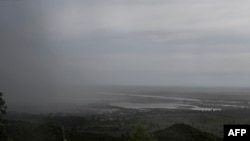More than 150 people were killed and hundreds more were missing Sunday after Cyclone Idai swept through southeastern Africa, with the Mozambican city of Beira hardest hit.
Mozambique's president Filipe Nyusi speculated that the death toll in his country, currently confirmed at 84, could rise to "more than 1,000".
"This is a real humanitarian disaster," he said in a nationwide address, estimating that "more than 100,000 people are in danger."
A team of International Federation of Red Cross and Red Crescent Societies (IFRC) aid workers reached the devastated city Sunday to assess the situation, the organization said in a statement Monday.
Jamie LeSueur, who is leading the team, said after an aerial assessment that 90 percent of the Beira area was "completely destroyed."
"The situation is terrible. The scale of devastation is enormous," LeSueur said in a statement.
The United Nations estimates more than 1.5 million people in Mozambique, Malawi and Zimbabwe were affected by the storm. Tens of thousands have been cut off from roads and telephones in mainly poor, rural areas.
The cyclone made landfall Thursday near the coastal city of Beira, Mozambique, with winds of nearly 200 kilometers per hour. The storm then moved west into Malawi and Zimbabwe.
Video in Beira by VOA's Portuguese service shows splintered trees and downed power lines throughout the city.
“Tropical Cyclone Idai… has compounded destructive flooding that has already occurred as far inland as southern Malawi and eastern Zimbabwe,” World Food Program spokesman Hervé Verhoosel told journalists in Geneva.
Official sources in Mozambique say at least 68 people were killed in the cyclone. Zimbabwean officials told reporters that 89 people died in Zimbabwe.
In Zimbabwe's eastern Chimanimani district, soldiers on Sunday helped rescue 200 students and staff from a school that was cut off by floodwaters and mud.
The presidents of Mozambique and Zimbabwe cut short their overseas trips to deal with the aftermath of the cyclone.
U.N. agencies and the International Red Cross are helping with rescue efforts, while also delivering food, water and medicines by helicopter.






